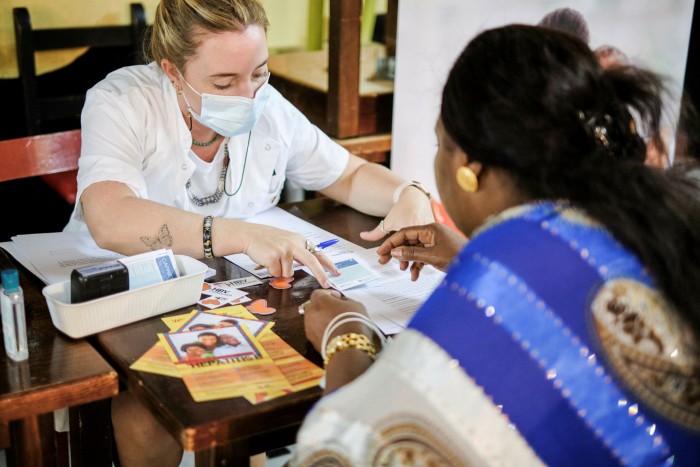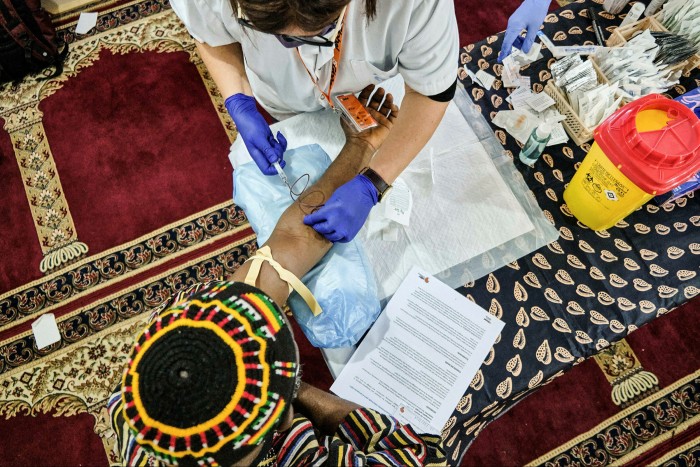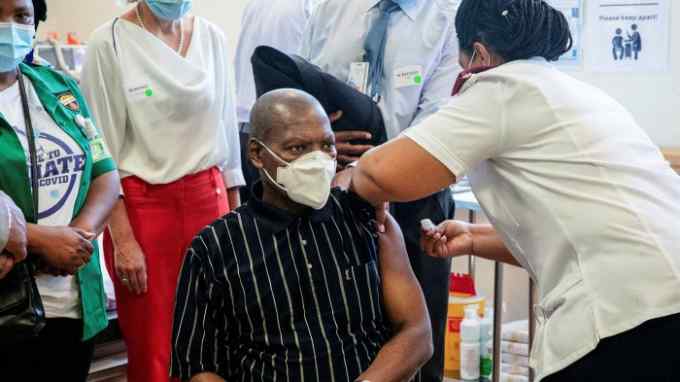Barcelona testing scheme brings outsiders into the health system

Roula Khalaf, Editor of the FT, selects her favourite stories in this weekly newsletter.
On a recent Saturday, health worker Camila Picchio had to tell one of the visitors to her outreach clinic that he had just tested positive for hepatitis B.
The man, a Senegalese migrant living in Barcelona, did not take the news in stride. He was, Picchio says, “very upset, very distraught, anything you’d say to him — he was not responding well . . . I thought he was going to pass out.”
Yet Picchio was able to get back-up from one of the man’s fellow migrants, a co-ordinator on the outreach scheme, who persuaded him to call his wife and see a doctor.
HBV-Comsava — as the Barcelona-based scheme is called — aims to identify undetected cases of hepatitis B, a virus that can cause severe liver damage and has a high prevalence in sub-Saharan Africa. Like similar initiatives globally, its purpose is to bring patients who would otherwise go untreated into the primary healthcare system in order to prevent sickness and to save costs later on.
Picchio and her colleagues target patients from migrant communities, regularly going on testing sorties in the city’s metropolitan area. Helped by community volunteers, they approach people in places of worship and other social hubs, and, crucially, do not ask for proof of residence or immigration status.
Though the initiative, devised before the pandemic, is only a pilot study, it has already proved an “effective model to deliver healthcare services in decentralised settings”, says Picchio. A pre-doctoral fellow at the University of Barcelona, she both manages HBV-Comsava — which stands for Hepatitis B Virus Community Screening and Vaccination in Africans — and is one of a team of researchers analysing its performance.
Not only does it reduce pressure on hospitals and primary care centres, she says, it also uses “comfortable and familiar spaces to [reach] people who are often marginalised”.
Those who consent are registered with the regional health system and can go on to access primary care, where other conditions — such as diabetes and hypertension — can be managed.
The need for such schemes has been underscored by the Covid-19 pandemic, which has exposed the social faultlines in healthcare, with certain groups at higher risk of contracting the disease and falling seriously ill. At the same time, the virus has threatened to undo progress in other areas of public health.
The World Health Organization has warned that the burden imposed by easily manageable conditions such as measles and tuberculosis is likely to increase because resources have been diverted — a problem that will be exacerbated if hard-to-reach populations fall through the net.
“There was a big case of people being scared to go to a hospital for any other issue during Covid for fear of getting Covid,” says Picchio. “The model can be adapted to specific population needs and scaled up.”
The data, so far, look promising. In the region of Catalonia, of which Barcelona is the capital, the general prevalence of hepatitis B is 0.5 per cent. In the study, 9 per cent of samples to date have tested positive — which Picchio says is “astonishing”, especially given that most of her patients come from places where the disease is endemic and should have been diagnosed beforehand.
Of just under 400 people tested, nearly half had no immunity from past infection, and so qualified for vaccination; of these, 64 per cent made a follow-up visit, most of whom — 85 per cent — chose to have a jab (two further doses are also needed).

The study is funded by pharmaceutical company Gilead Sciences, and run in collaboration with the Catalan health department and two university hospitals in the city. It was co-developed with leaders from the region’s Senegalese and Ghanaian communities.
Its principal investigator, Jeff Lazarus — a former WHO employee now at the Barcelona Institute for Global Health (ISGlobal) — says Catalonia has been different in giving these immigrant populations full healthcare.
“It’s just hepatitis B, but we reached it because we reached it,” he says. “Our battle right now is to get them Covid-19 vaccines.” He would like to see the scheme extended beyond Barcelona and ultimately to all of Spain.
Similar outreach programmes in Spain and other countries have focused on hepatitis C, tuberculosis and HIV. Whatever the disease, the costs of caring for patients in the later stages of infection far outweigh those of early detection.
With thoughtful design and sensitive implementation, such schemes can help assuage the fears of communities where infection is prevalent but stigmatised, or where state agencies are mistrusted.
Picchio says that, even if the testing sorties sometimes take place in “very high-stress environments”, they are worth it.
“When we go to a Mass service, there’s live music, they’re dancing, it’s very loud, we’re trying to draw blood, there [are] children running around, drums right in your head, you’re trying to have a conversation with someone to get their epidemiological data,” she says. “But everyone’s been extremely welcoming and so thankful we’re there.”
Picchio recalls a June visit to a local mosque where, after the testing had been done, the imam brought out kilos of delicious dates for every team member.
The previous imam, she says, had died of hepatitis B-related cancer.

Comments